
Gopalaratnam Subramaniam, known professionally as Mani Ratnam, is an Indian film director, film producer and screenwriter who predominantly works in Tamil cinema and few Hindi, Telugu, Malayalam and Kannada films. He is one of India's most acclaimed and commercially successful filmmakers. Ratnam has won six National Film Awards, four Filmfare Awards, six Filmfare Awards South, and numerous awards at various film festivals across the world. In 2002, the Government of India honoured him with the Padma Shri, acknowledging his contributions to film.

Bombay is a 1995 Indian Tamil-language romantic drama film written and directed by Mani Ratnam, starring Arvind Swamy and Manisha Koirala. The film tells the story of an inter-religious family in Bombay before and during the Bombay riots, which took place between December 1992 and January 1993 after the demolition of the Babri Masjid led to religious tensions between Hindu and Muslim communities. It is the second installment in Ratnam's trilogy of films that depict human relationships against a background of Indian politics, including Roja (1992) and Dil Se.. (1998).

Anjali is a 1990 Indian Tamil-language children's drama film written and directed by Mani Ratnam. It stars Raghuvaran and Revathi, with Tarun, Shruti and Shamili in supporting roles. The film deals with the story of a dying mentally disabled child, and the emotional trauma experienced by her family.

Nayakan ( transl. Hero) is a 1987 Indian Tamil-language epic crime drama film written and directed by Mani Ratnam. Produced by Muktha Srinivasan, the film stars Kamal Haasan, Saranya and Karthika, with Janagaraj, Vijayan, M. V. Vasudeva Rao, Delhi Ganesh, Nizhalgal Ravi, Nassar and Tara in supporting roles. It revolves around the gradual transformation of Velu Naicker (Haasan) from an ordinary slum dweller to a highly respected don.

Mouna Ragam is a 1986 Indian Tamil-language romantic drama film written and directed by Mani Ratnam, and produced by G. Venkateswaran. The film stars Mohan and Revathi, with Karthik, V. K. Ramasamy, Ra. Sankaran, Bhaskar, Kanchana, Vani, Kalaiselvi and Sonia in supporting roles. It narrates the life of Divya (Revathi), a free-spirited college girl who is forced into an arranged marriage with Chandrakumar (Mohan) by her father (Sankaran). But, she still lives in the memory of her past lover Manohar (Karthik). The story follows Divya's inner conflict between holding onto her past and coming to terms with the present.
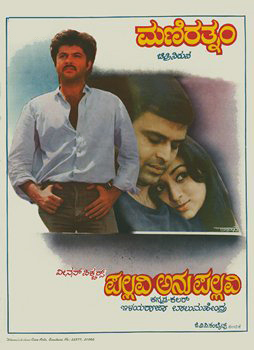
Pallavi Anu Pallavi is a 1983 Indian Kannada-language romantic drama film written and directed by Mani Ratnam in his debut. The film stars Anil Kapoor, Lakshmi, and Kiran Vairale. It revolves around a young man falling in love with a slightly older woman. The music was composed by Ilaiyaraaja, while cinematography was handled by Balu Mahendra. The film is also Kapoor's debut in Kannada cinema.

Pagal Nilavu is a 1985 Indian Tamil-language gangster film directed by Mani Ratnam, starring Murali, Revathi and Sathyaraj. It is about a carefree youth caught between his loyalty to a mafia don and his love for a police officer's sister.
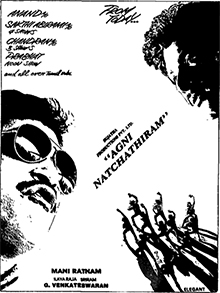
Agni Natchathiram is a 1988 Indian Tamil-language masala film that was written and directed by Mani Ratnam. The film stars Prabhu, Karthik, Amala and newcomer Nirosha, with Vijayakumar, Jayachitra, Sumithra, Tara, S. N. Lakshmi and G. Umapathy in supporting roles. Its story revolves around two half-brothers who come into conflict with each other due to their claims for legitimacy as sons of a common father.
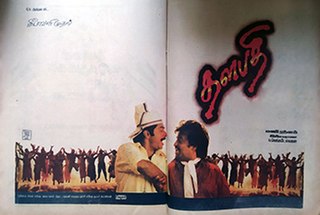
Thalapathi (transl. Commander) is a 1991 Indian Tamil-language crime gangster film written and directed by Mani Ratnam, and produced by G. Venkateswaran. The film stars Rajinikanth and Mammootty with Arvind Swamy in his feature-film debut, Jaishankar, Amrish Puri, Srividya, Bhanupriya, Shobana and Geetha in supporting roles. It is about a courageous slum dweller who befriends a powerful don and the attempts of a district collector to thwart them.
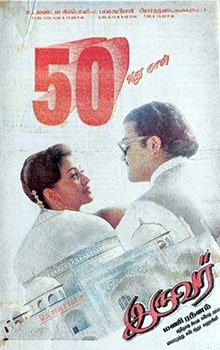
Iruvar is a 1997 Indian Tamil-language epic political drama film co-written, produced and directed by Mani Ratnam. The film, inspired by the lives of M. Karunanidhi, M. G. Ramachandran and J. Jayalalithaa is set against the backdrop of cinema and politics in Tamil Nadu. It stars an ensemble cast including Mohanlal, Prakash Raj, Aishwarya Rai, Revathi, Gautami, Tabu and Nassar. Rai, who was crowned Miss World 1994, made her screen debut through the film, playing dual characters.
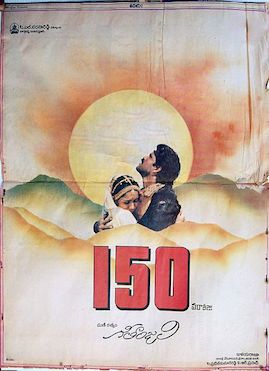
Geethanjali is a 1989 Indian Telugu-language romantic drama film written and directed by Mani Ratnam. It stars Nagarjuna and Girija who appears as the titular character in her film debut. The music is composed by Ilaiyaraaja. Upon release, the film was a commercial success, running for over 100 days in theatres. The film won National Film Award for Best Popular Film Providing Wholesome Entertainment and also won six Nandi Awards. The film was later remade in Hindi as Yaad Rakhegi Duniya (1992).

Idaya Kovil is a 1985 Indian Tamil-language film directed by Mani Ratnam, starring Mohan, Ambika, Radha and Goundamani. The score and soundtrack were composed by Ilaiyaraaja which went on to become huge hits. The film, released on 14 September 1985, did well at the box office.
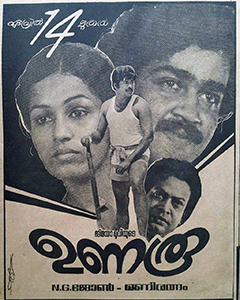
Unaroo is a 1984 Indian Malayalam-language political drama film directed by Mani Ratnam and written by T. Damodaran, starring Mohanlal, Sukumaran, Ratheesh, Sabitha Anand, Ashokan and Balan K. Nair, with music composed by Ilaiyaraaja and cinematography by Ramachandra Babu. The film gives the inside view of the problems that arose in the labour trade union parties in Kerala. It was released on 14 April 1984.
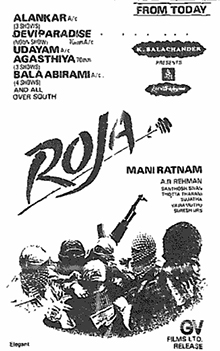
Roja (transl. Rose) is a 1992 Indian Tamil-language romantic thriller film written and directed by Mani Ratnam. It stars Arvind Swami and Madhoo, with the latter in the title role. It follows a simple girl from a village in Tamil Nadu, making desperate efforts to find her husband after he is kidnapped by militants during a secret undercover mission in Jammu and Kashmir.

Moondram Pirai is a 1982 Indian Tamil-language romantic drama film written, directed and filmed by Balu Mahendra. The film stars Kamal Haasan and Sridevi, while Y. G. Mahendran, Silk Smitha and Poornam Viswanathan played supporting roles. It revolves around a school teacher who rescues a woman with retrograde amnesia, from a brothel, and protects her in his house located in Ketti. The rest of the film shows how the woman recovers her memory with the teacher's help.
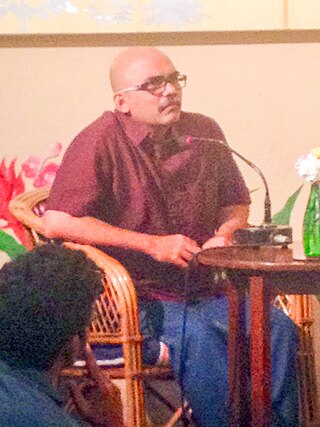
Baradwaj Rangan is an Indian film critic and writer. A chemical engineering graduate with no formal training in filmmaking or cinema writing, he has had a diverse career in advertising, IT consulting, and cinema writing. He has authored two books on Indian cinema, written for The New Indian Express, The Hindu, and Tehelka, and has been a screenwriter and teacher. As a film critic, Rangan won the Best Film Critic category at the 53rd National Film Awards in 2006. He was the editor of Film Companion South until 2022 and is a member of the Film Critics Circle of India. Rangan currently works as a critic and chief editor for Galatta Plus and runs a Spotify podcast Cinema With Baradwaj Rangan.
Mani Ratnam is an Indian filmmaker who works predominantly in Tamil cinema. Regarded as one of the greatest Indian filmmakers, he is credited with redefining the "range and depth of Tamil cinema". As of 2019, he has directed 28 films, and produced over 15 under his production company Madras Talkies.
The loosu ponnu is a stock character in Tamil cinema, a girl who is portrayed as attractive but naïve and unintelligent. It is regarded as the equivalent of the Manic Pixie Dream Girl and dumb blonde stereotypes in the United States. The loosu ponnu trope became increasingly popular in 1990s Tamil cinema when the masculinity of the hero became severely overblown. It has since received criticism for being misogynistic and regressive.

Dilip Kumar: The Substance and the Shadow is a book about the filmmaker and politician Dilip Kumar that was written by the film journalist Udaya Tara Nayar. The first part of the book chronicles Kumar's and career; using first-person narrative, the autobiography chronicles Kumar's childhood in Peshawar, British India ; his education, his 62-year-long cinematic and political career, and his two marriages. The other part contains recollections from 43 of his collaborators and acquaintances. It was published on 20 June 2014 by Hay House.
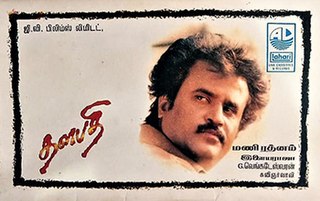
Thalapathi is the soundtrack album composed by Ilaiyaraaja, with lyrics written by Vaali, for 1991 Indian Tamil-language film of the same name which was written and directed by Mani Ratnam, and produced by G. Venkateswaran. The film stars Rajinikanth and Mammootty with Arvind Swamy in his feature-film debut, Jaishankar, Amrish Puri, Srividya, Bhanupriya, Shobana and Geetha in supporting roles. It was the last collaboration between Ilaiyaraaja, Vaali and Ratnam as the latter had associated with A. R. Rahman and Vairamuthu for all of his projects, beginning with Roja (1992), which marked Rahman's debut.


















